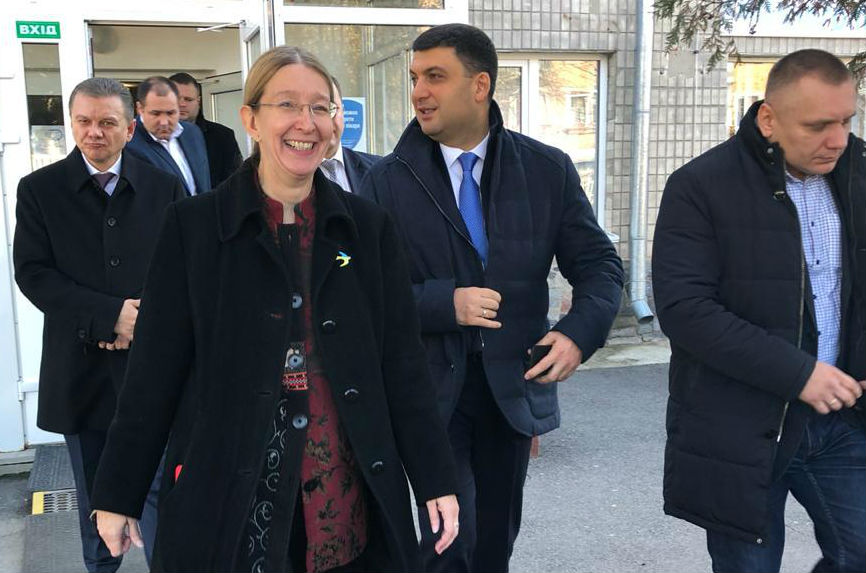
There was a distinct sense of the theatrical inside and outside Kyiv’s Administrative Court #2 earlier this month as it decided the fate of Dr. Ulana Suprun, Ukraine’s acting minister of health.
Leaving the proceedings, one was left with at least two seemingly absurd questions: what was this showdown all about and why was an “administrative court” deciding the fate of a politically appointed cabinet minister?
All societies where corrupt ethical practices hold sway tend to produce narratives which suggest both an overt and hidden meaning, and which, almost always, cause confusion as to the meaning of the narrative that people have witnessed.
However, from the beginning there was never any doubt that this was a political showdown instigated by MP Ihor Mosiychuk, seen throughout the country as he was filmed accepting bribes, and three political parties, Opposition Bloc, Fatherland, and the Radical Party, to personally discredit the minister and her efforts at “transformative reform” of the country’s medical system.
What became immediately evident was that this clash was never really about the questions of her citizenship, or her status as “acting minister,” or even about who was running the ministry or had signing authority while she traveled on business.
How did we get here?
From the beginning, Suprun’s presence in government and her leadership at the health ministry foreshadowed an existential challenge to the historic governing approaches and practices of the ministry. She always was clearly and enthusiastically opposed to the status quo and continues to see herself as a transforming change agent.
Foremost, corruption and its practices had to be identified, confronted, and eliminated as a governing factor in ministry business.
There can be no mistake that her public language and the tone she set in the ministry was informed and energized by a sense of idealism.
Her objective was to imprint a core set of values and practices onto the ministry’s institutional structures. Values inspired by the principle of human dignity, respect for the expression of individual choice, and the right to articulate individual decision-making over one’s life. Suprun’s stance hasn’t changed: government is meant to serve its citizens, while providing medical services in a responsible and accountable manner.
Suprun inspired a foundation for a new health care system that provides an alternative to one conceived in Soviet times, and which now has the opportunity to employ modern management practices, techniques, and technological innovation.
Ukraine’s 44 million citizens have been given the opportunity to choose their own doctor, which millions have done.
These same values led her to establish and employ transparent processes of tendering in pharmaceutical purchasing that would ensure financial accountability.
During her tenure, Suprun has recalibrated the philosophy and practices of a major federal ministry, illustrating, and so proving, that institutional reform at the ministry level, is possible.
In one way, she not only established a viable “alternative,” but provided a new model of governance, one that provides an example to other ministries.
In doing so, she provoked, by identifying and exposing how “public criminals” abuse and take advantage of public budgets, and so wounding the aspirations of a corrupt medical establishment who governed by corrupt practices and leveraged personal relationships to do so.
The showdown at the administrative courthouse, or rather, the public charade that outwardly seemed to take on the nature of a legal confrontation, between the forces of transformative reform and those that resist any structural change, was an example of the failure of Ukraine’s still untransformed post-Maidan political culture.
This culture does not use facts or rhetorical techniques to challenge a public policy with which one disagrees within a legislative body, but rather attacks a political opponent through personal defamation, casting doubt upon the integrity of another’s character and motives, especially one who has strived, with sincerity, to pursue the public good.
Was this action solely an effort to discredit Suprun? Could this operation be judged as an act against fundamental transformative change? Yes to both.
The facts suggest that this was another chapter in Ukraine’s ongoing struggle pitting the oligarchs and clans of the ruling class against those whose chief aim is to seek solutions that reflect the values, economic interests, and needs of the public they serve.
Yuri Polakiwsky is a Kyiv-based writer and author of “Ukraine – A Lament of a Promise.”
Image: Dr. Ulana Suprun, the acting minister of health, smiles in Kyiv, Ukraine, on November 16, 2018. Credit: Ulana Suprun Facebook
